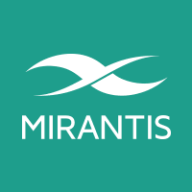

Mirantis Container Cloud and Prisma Cloud by Palo Alto Networks compete in cloud management. Prisma Cloud seems to have an upper hand due to its comprehensive security features and integration capabilities, while Mirantis is recognized for its pricing structure and support satisfaction.
Features: Mirantis Container Cloud offers multi-cloud management capabilities, providing a unified experience across platforms, seamless cloud orchestration, and cost-effective solutions. Prisma Cloud excels in robust security features, including threat detection and compliance management, making it suitable for security-focused needs. It also integrates well with various DevOps tools, enhancing operational efficiency.
Room for Improvement: Mirantis Container Cloud could enhance its security features by integrating more advanced threat detection capabilities and improving scalability options for large-scale deployments. Documentation could also be more detailed to facilitate easier troubleshooting. Prisma Cloud could focus on reducing its pricing model to make it more affordable for smaller businesses and enhance the user interface for easier navigation. Additionally, the deployment processes could be simplified to reduce setup times further.
Ease of Deployment and Customer Service: Prisma Cloud provides a straightforward deployment model prioritizing security integration, with responsive and knowledgeable customer service. Mirantis Container Cloud offers customizable deployment experiences and dedicated support teams that enhance customer service, although users might find its deployment less straightforward than Prisma Cloud.
Pricing and ROI: Mirantis Container Cloud offers competitive pricing models with a substantial ROI derived from operational efficiency. In contrast, Prisma Cloud's pricing, although higher, is justified by its extensive security features and delivers greater ROI in security-enhanced environments. Both products have their respective strengths in pricing strategies and ROI delivery.
| Product | Market Share (%) |
|---|---|
| Prisma Cloud by Palo Alto Networks | 9.0% |
| Mirantis Container Cloud | 0.3% |
| Other | 90.7% |

| Company Size | Count |
|---|---|
| Small Business | 15 |
| Midsize Enterprise | 3 |
| Large Enterprise | 17 |
| Company Size | Count |
|---|---|
| Small Business | 36 |
| Midsize Enterprise | 22 |
| Large Enterprise | 56 |
Mirantis Container Cloud is a secure container platform for any cloud. It provides organizations with unmatched speed to ship code quicker on public clouds and on-premise infrastructure. Mirantis Container Cloud is the simplest method for building and managing Kubernetes clusters anywhere with one consistent cloud experience for developers and operators across public and private clouds. It enables full application and DevOps portability.
Mirantis Container Cloud simplifies infrastructure management by allowing you to deploy clusters anywhere on demand with one reliable connection, minimizing operational costs and increasing developer productivity. Mirantis Container Cloud is a clear solution for the world's most regulated businesses, with end-to-end security enabled by default and the highest level of FIPS 140-2 and DISA STIG compliance. Developers can quickly ship code by creating, monitoring, and managing their own Kubernetes clusters within pre-established boundaries using the self-service portal.
Mirantis Container Cloud Features
Mirantis Container Cloud has many valuable key features. Some of the most useful ones include:
Reviews from Real Users
Mirantis Container Cloud stands out among its competitors for a number of reasons. Two major ones are its deployment of images and the portability of its containers. PeerSpot users take note of the advantages of these features in their reviews:
Cristina C., Test Architect at a tech services company, writes of the solution, “The idea that you can configure an image, deploy it, and it can be reused and redeployed with the same setup over and over again is a valuable feature.
A DevOps Engineer at a tech services company, notes, “I like that Mirantis’ main products of containers are very portable. Any possible issues, problems, or troubles are fixed with improvements of the platform itself. Any constraints that Mirantis [has], have been fixed with other products or features that Mirantis provides.”
Prisma Cloud by Palo Alto Networks provides comprehensive cloud-native security solutions. It covers dynamic workload identity, automated forensics, and multi-cloud protection, ensuring robust security across diverse cloud platforms.
Prisma Cloud delivers advanced capabilities for managing cloud security across AWS, Azure, and GCP platforms. It offers dynamic workload identity creation, real-time monitoring, and seamless integration into CI/CD pipelines. With automation, centralized dashboards, and enhanced visibility, users effectively manage security misconfigurations and vulnerabilities. While optimizing cloud environments through runtime protection and compliance, Prisma Cloud faces challenges with its navigation, pricing, and limited automation capabilities. Users seek improvements in API security, role-based access controls, and documentation quality, emphasizing the need for enhanced customization and reporting features.
What are the important features of Prisma Cloud?
What benefits or ROI should users consider in reviews?
Industries like finance and telecom rely on Prisma Cloud for managing cloud security posture and container security. Teams utilize its capabilities across hybrid and multi-cloud settings to ensure compliance and robust threat protection. Features like misconfiguration detection and runtime monitoring are critical in promoting security objectives in these sectors.
We monitor all Container Security reviews to prevent fraudulent reviews and keep review quality high. We do not post reviews by company employees or direct competitors. We validate each review for authenticity via cross-reference with LinkedIn, and personal follow-up with the reviewer when necessary.